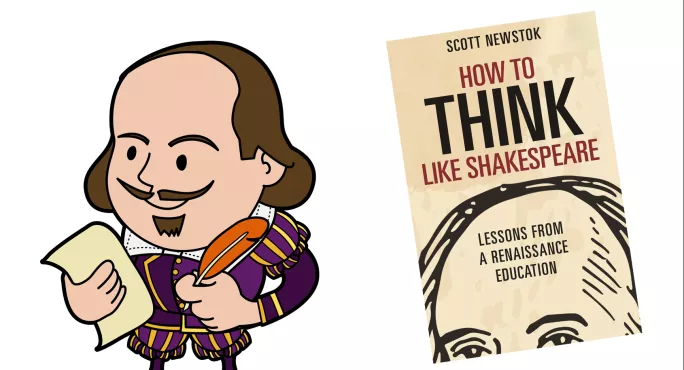- Home
- Book review: How to Think Like Shakespeare
Book review: How to Think Like Shakespeare

How to Think Like Shakespeare: Lessons from a Renaissance education
Author: Scott Newstok
Publisher: Princeton University Press
Details: 185pp, £16.99
ISBN 978-0691177083
Traditional pedagogies are making a comeback.
This statement, at a time when teachers are incorporating digital technologies into their practice as a matter of urgent necessity, may seem surprising.
One of the starkest truths in our current circumstances, however, is that online learning - according to all available data - serves only to further embed disadvantage.
Used well, and under the guidance of a teacher, technology can be an excellent tool for learning. But if lockdown teaching has taught us anything, it is that online services are a poor proxy for teacher-led instruction.
This is one of the key themes of Scott Newstok’s book, which condemns our propensity to see digital technologies as the magic solution for educational ills, castigating these attitudes as “a creed, unshakeable in the face of mounting evidence that computers don’t improve learning”.
The purpose of education
The essence of How to Think Like Shakespeare is a rebuttal to the short-termism of attitudes that prioritise the quick fix, whether that is the “the next version will be better!” promises of the edtech industry or the target-driven assessment culture familiar to US and UK educators alike.
The crux of Newstok’s argument is that we have lost sight of the true ends of education, which are, in the tradition of Aristotle, to create thoughtful, articulate members of society, able to participate actively in civic life.
These ends, Newstok argues, have been displaced by grades and targets that add nothing to the social fabric or to the personal development of our young people.
How to Think Like Shakespeare proposes nothing short of a paradigmatic shift in our understanding of education and its ends.
The craft of thinking
While targets are held over the heads of schools and of teachers, it is difficult to imagine a true commitment to something as nebulous as teaching “the craft of thinking”.
Newstok, nevertheless, makes a convincing case for the necessity of just that. For him, “thinking is as much of a craft as any physical trade”, and as such it can and indeed should be taught.
It is in the educational techniques of the Renaissance era that Newstok, a professor of English and founding director of the Pearce Shakespeare Endowment at Rhodes College in Tennessee, finds his model.
In looking back to the educational context that produced Shakespeare, Newstok is not suggesting a return to long school days, corporal punishment or the exclusion of girls and women, but he does find, in certain traditional pedagogies, something richer than anything our current systems allow.
In the traditional arts of conversation and rhetoric, for example, Newstok identifies “nothing less than the fabric of thought itself”.
Questioning and debate
It is not surprising then that cultivating oral literacy through questioning and debate is one of the key takeaways this book presents.
Supporting and building on this, Newstok argues for the importance of a common “stock” of knowledge from which learners can draw, enabling them, through other renaissance teaching methods such as imitation, emulation, repetition and memorisation, to construct deep and thoughtful responses to life’s many important questions.
As some readers have no doubt recognised, several of the traditional methods that Newstok praises here are things that have already had something of a resurgence.
A growing research base has suggested the effectiveness of things like conversation, which is central to dialogic teaching, and imitation, which we see today in the preponderance of model answers and live modelling used in the classroom.
Even Newstok’s central thesis that thinking should be at the heart of education is supported by data that has consistently shown that we remember the things we think about.
Despite its seemingly regressive subtitle, then, How to think Like Shakespeare is remarkably current and on-trend.
A good read to boot
What makes Newstok’s book stand out from other texts promoting a back-to-basics approach is the lively writing and the playful intertextuality of the prose.
Every page of this book brings together a patchwork of quotes from both classical and contemporary sources, from Shakespeare (naturally) to James Baldwin and beyond.
This interweaving of voices, cumulatively bearing the intellectual weight of generations, supports Newstok’s key assertions about the importance of “stock” - the pool of established works from which Western culture draws (the canon) - and the importance of building on others’ ideas through processes of imitation and emulation, which then lead to something new.
In this way, the construction of How to Think Like Shakespeare itself exemplifies many of Newstok’s core ideas.
It is this cleverness, lightly worn yet unabashed, that elevates and enlivens the text.
Victoria Addis is an English teacher in the East Midlands and the editor of AC Review of Books. She tweets about teaching at @ms_a_englit
Keep reading for just £1 per month
You've reached your limit of free articles this month. Subscribe for £1 per month for three months and get:
- Unlimited access to all Tes magazine content
- Exclusive subscriber-only stories
- Award-winning email newsletters

